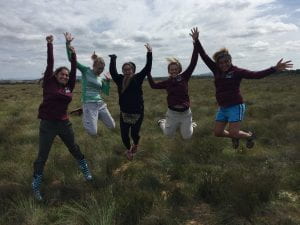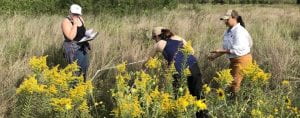Study with me in Ireland!

STUDY ABROAD PROGRAM – Offered most summers
6 Credit Option (*Both courses must be taken concurrently while traveling in Ireland = 6 credits total).
BIO 4327/5327: Issues in Irish Biodiversity and Conservation – In this course, students will learn about Irish flora and fauna, ecosystems, conservation strategies in areas of high ecological concern, and public involvement. Emphasis will be placed on case studies and service-learning opportunities.
BIO 4328/5328: Field Biology of Ireland – In this course, students will use multiple techniques to explore biodiversity across multiple ecosystems in Ireland.
3 Credit Option (for students wanting to only take one class while traveling, or students intending to transfer credits to a different institution):
BIO 4350Z/5350Z: Diversity and Cultural Impacts of Geoparks – In this course, students will explore biological differences in diversity across Geoparks in the United States and Ireland. Additionally, students will study the cultural impact that Geoparks have on the local community and national policy by focusing on differences between science communication strategies and community engagement practices conducted at the parks.
or
BIO 7314: Collaborative Research – In this course, Ph.D. level graduate students will initiate, conduct, and participate in collaborative research with graduate faculty of the Department of Biology. This course recognizes the collaborative nature of scientific investigation.
Study with me in San Marcos!

BIO 4400/5400: Plants Important to Wildlife – This course explores plant taxonomy and plant part (specifically gall, fruit, seed, and twig) identification, phylogenetics, co-evolution of plant defenses, economic and ecological impacts of plant uses by wildlife.
Offered Every Fall
BIO 5100/7100: Professional Development – This course is intended for new Graduate Student Instructional Assistants and we cover topics related to teaching biology labs at Texas State University. Completion of the course is required as a condition of employment for graduate assistants.
Offered Every Fall
BIO 7102: Seminar in Aquatic Resources – Topics for this course vary. My section typically offers a book club style discussion about science and society or research essentials in the fall or a series of writing retreats in the spring. Potential students are welcome to contact me prior to enrolling for more details when this course is offered.
BIO 7300: Communicating Science – This course explores how to successfully disseminate science through visualizations, oral presentations, and written works to multiple audiences. Special emphasis will be placed on communicating with the general public, media, granting agencies, and science peers.
Offered every other Spring (in Odd Years, 2023, 2025, etc.)
BIO 4317/5317: Interpretive Biology Programming and Design – This course explore the methods and principles used by the National Park Service, Museums, Environmental Centers, and State Park systems to interpret biology and natural environments effectively as well as interest a variety of audiences. Students will practice skills in both personal and non-personal interpretation by creating science outreach programs, interpretive literature, brochures, path waysides, and other interpretive media. New Course to be offered Spring 2024
Other courses taught on occasion (in Even Spring Years):
BIO 7301: College Science Teaching – This course is designed for graduate students in the sciences who are interested in improving their science teaching and/or are interested in pursuing careers in academia. This course focuses on the central question, “How do college students best learn science, and thus how do we best teach them?” As part of this course, enrolled students will gain practical experience as they assist in teaching HON 2303D Everyday Biology.
HON 2303D: Everyday Biology – This course provides the non-science major with a strong foundation of scientific methods and basic biological concepts. Special emphasis is placed on reviewing biological concepts relevant to everyday life (both current and future) including disease, evolution, genetics, biotechnology, diet, and environmental biology.
BIO 7361A: Discipline-Based Educational Research Methods – This course will expose science graduate students to educational and social science research methods in a practical setting, supervised by a professor experienced in conducting discipline-based educational research, focusing primarily on qualitative methods.